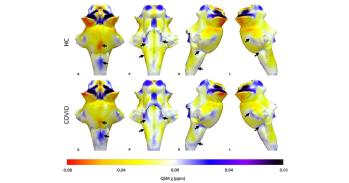
A new centre which will research the vital biological interactions between a mother and her fetus launched today, Wednesday 9 July, at the University of Cambridge.
A new centre which will research the vital biological interactions between a mother and her fetus launched today, Wednesday 9 July, at the University of Cambridge.
By bringing together cutting-edge basic and translational research I am optimistic that this initiative will soon yield benefits for patient care, as well as providing world-class training for future generations of researchers.
Professor Graham Burton
The Centre for Trophoblast Research will promote the study of placental biology, focusing on the unique cell type (trophoblasts) that makes up much of the placenta and forms the interface between the maternal and fetal tissues.
Trophoblasts are key to a successful pregnancy; they provide essential nutrients to the fetus, play a vital role in the production of hormones and prevent the mother's immune system from attacking the embryo. Failure of any these processes can be detrimental, putting not only the mother at risk but also the development and long-term health of her child.
The Centre was made possible by the generous gift of £5 million from a medical alumnus, and will be administered from the Department of Physiology, Development and Neuroscience, where it has a physical base in dedicated, newly refurbished laboratory space.
The Centre aims to provide an intellectual focus for researchers both within and outside Cambridge, to foster national and international research collaborations and to promote teaching and training in this area. It will build upon Cambridge's strong presence in this field and benefit from the wealth of international leaders in immunology, genetics and physiology.
Professor Graham Burton, Director of the Centre, said, "This is a tremendously exciting venture that will have a major impact on the field of placental biology. By bringing together cutting-edge basic and translational research I am optimistic that this initiative will soon yield benefits for patient care, as well as providing world-class training for future generations of researchers."
Professor Bill Harris, Head of the Department of Physiology, Development and Neuroscience, said, "Our department is a terrific home for this research centre. Our many strengths in developmental biology and physiology will benefit the Centre's work, and the Centre's focus on the fetal-maternal interface will inform and provide additional medical relevance for this research."
This work is licensed under a Creative Commons Licence. If you use this content on your site please link back to this page.





